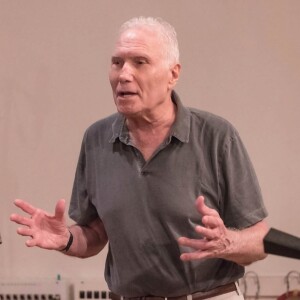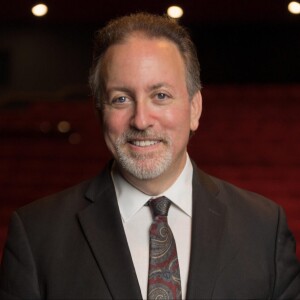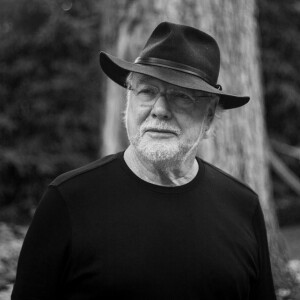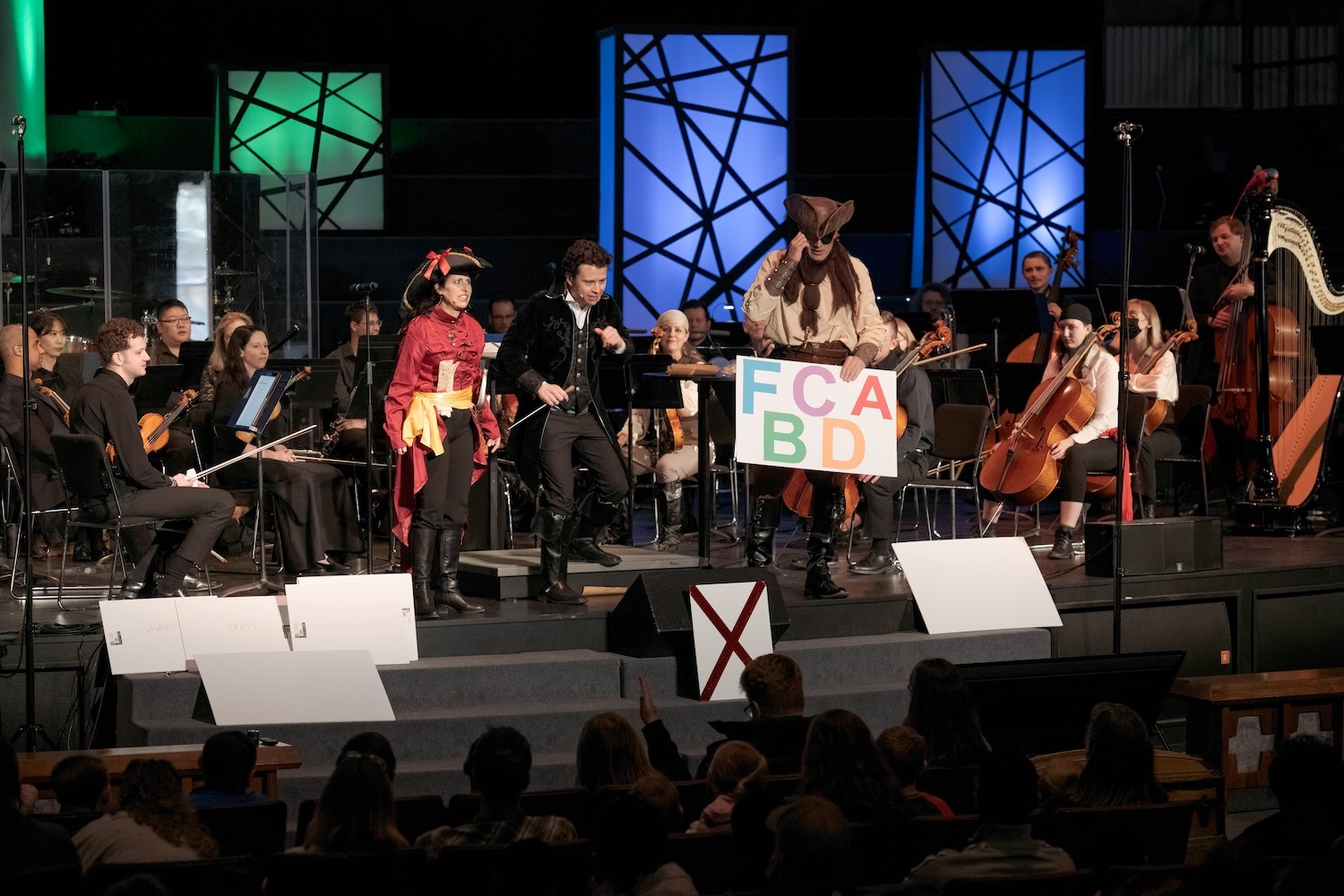One Symphony with Devin Patrick Hughes
A podcast that explores classical music’s relevance in our modern lives. Conductor Devin Patrick Hughes will share with you stories and conversations with musicians, composers, and artistic entrepreneurs that aim to unite us into one symphonic world. New episodes every other Monday.
A podcast that explores classical music’s relevance in our modern lives. Conductor Devin Patrick Hughes will share with you stories and conversations with musicians, composers, and artistic entrepreneurs that aim to unite us into one symphonic world. New episodes every other Monday.
Episodes

7 days ago
7 days ago
In this episode of One Symphony, conductor Devin Patrick Hughes sits down with acclaimed film and television composer Lesley Barber for a wide-ranging, behind-the-scenes conversation about writing music that reveals what characters can’t say out loud.
Lesley shares how improvising and composing before formal training shaped her voice, how pop, R&B, and composers like Schubert, Bach, and Chopin influenced her musical language, and why her chamber-score approach to Maurice Sendak’s Little Bear became so enduring that listeners now pass it down to the next generation. The conversation then dives deep into Manchester by the Sea—from the time-crunch sprint to Sundance, to recording her daughter’s a cappella vocals in a dorm room for intimate “in-your-head” sound, then expanding into a large hall for an almost omniscient sense of space. Along the way, Lesley unpacks her fascination with fate, time, and music that can feel “mathematical” yet emotionally unavoidable, and why the most powerful film music often lives in the story’s absences—making the invisible audible.
Devin and Lesley also explore international orchestras, building creative teams across time zones, writing the Late Nighttheme under extreme deadline pressure, and what the future could look like for film music in the concert hall.
Music Selections Featured in This Episode
“Boarding School Titles” from the film Boarding School. Composed and performed by Lesley Barber.
“Sentimental Journey” from the film Mansfield Park. Composed by Lesley Barber.
“Hide & Seek” from the television series Little Bear. Composed by Lesley Barber.
“Manchester Minimalist Piano and Strings (Variation)” from the film Manchester By The Sea. Composed by Lesley Barber.
“Floating 149 A Cappella” from the film Manchester By the Sea. Composed by Lesley Barber.
“Smoke” from the film Manchester By The Sea. Composed by Lesley Barber.
“Molly’s Theme” from the film Late Night. Composed by Lesley Barber.
“That’s Our Show Everybody” from the film Late Night. Composed by Lesley Barber.
“Game of Cards” from the film Mansfield Park. Composed by Lesley Barber.
“Boarding School Titles” from the film Boarding School. Composed by Lesley Barber.
“Emily’s Theme” from the television series Little Bear. Composed by Lesley Barber.
“Terry’s Theme” from the film You Can Count on Me. Composed by Lesley Barber.
“Little Bear’s Room” from the television series Little Bear. Composed by Lesley Barber.
“Manchester Minimalist String Reprise” from the film Manchester By The Sea. Composed by Lesley Barber.

Wednesday Jan 21, 2026
Afro Bach, Rhythm, and Breaking Musical Walls — Joachim Horsley
Wednesday Jan 21, 2026
Wednesday Jan 21, 2026
In this episode of One Symphony, conductor Devin Patrick Hughes sits down with pianist/composer Joachim Horsley to explore Afro-Cuban rhythm, genre “walls,” and what orchestras can learn from dance-driven music. Horsley shares how he got “fired” from classical piano lessons, why rhythm is the “warrior that carries the message,” and how Afro Bachreimagines Bach through Caribbean and Latin frameworks—without losing the soul of the original.
Episode excerpts include:
“Bach’s Cuban Concerto for Piano and Tres”
“Beethoven in Havana”
“African Partita (Afro Bach Overture)”
“Bach Cumbia”
“Afrobeats Prelude and Amapiano Fugue”
Want behind-the-scenes extras and a way to support the show? Join the Patreon:https://patreon.com/OneSymphonywithDevinPatrickHughes?utm_medium=unknown&utm_source=join_link&utm_campaign=creatorshare_fan&utm_content=copyLink

Monday Nov 24, 2025
John Williams: A Composer’s Life — with author Tim Greiving
Monday Nov 24, 2025
Monday Nov 24, 2025
Conductor Devin Patrick Hughes sits down with author and USC musicology instructor Tim Greiving to dive into John Williams: A Composer’s Life (OUP)—the first full-scale biography of the world’s most beloved film composer. Greiving traces a lifelong fandom that began with a Jurassic Park cassette, then details the five-year journey of the book: 5:30 a.m. writing rituals, a year of archival research, and rare long-form conversations with Williams at the Amblin bungalow. Together they explore Williams’ jazz and Great American Songbook roots, his Brahms-leaning aesthetic, and how he revived—and refined—the classic Hollywood symphonic tradition with Spielberg and Star Wars. You’ll hear why Greiving calls Williams “closer to a church composer,” how the E.T. finale let the music lead picture, why the orchestra is truly timeless, and the astonishing revelation about Williams’ grandfather, Thomas Nagel, a silent-era cinema music director. Close with a lightning round on favorite themes, underrated scores, and the one word that captures John Williams.
Featured music:Star Wars Main Title • “Fascinatin’ Rhythm” (arr. JW) • Jurassic Park Theme • “Baubles, Bangles, and Beads” (JW Trio) • “Hatikvah” from Munich • “Luke & Leia” • The Quiet Man Main Title • Seven Years in Tibet Main Theme (w/ Yo-Yo Ma) • Superman Main Theme • Schindler’s List Theme (Itzhak Perlman) • Piano Concerto No. 1 (Ax/BSO) • Violin Concerto No. 2: II “Rounds” (Mutter/BSO) • “Harry’s Wondrous World” • “Adventures on Earth” (VPO) • “Flight to Neverland” (VPO) • Close Encounters excerpts (VPO) • “Hedwig’s Theme” • “Flying” (E.T.) • “Throne Room & Finale” (Berlin Phil)

Monday Sep 22, 2025
Beethoven: Triumph Over Adversity with John Suchet Part 2
Monday Sep 22, 2025
Monday Sep 22, 2025
In the second half of a special two part conversation, conductor Devin Patrick Hughes speaks with broadcaster and author John Suchet in Part 2 of a special two-part One Symphony series on Beethoven, based on Suchet’s new book In Search of Beethoven: A Personal Journey.
This episode explores Beethoven’s life in Vienna — his patrons, performance venues, and independence as a composer. We also dive into his personal struggles, including his court battle for custody of his nephew Karl and his gradual onset of deafness, described as the “worst fate for a musician.”
Through it all, Beethoven’s music speaks of resilience and triumph. Suchet reminds us: “If I can overcome what I had, the worst fate that can befall a musician, you too can overcome.”
Featured Music Includes:
Wolfgang Amadeus Mozart Piano Concerto No 22 in E-flat Major, K. 482 I. Allegro. Performed by the English Chamber Orchestra featuring Murray Perahia on piano.
Ludwig van Beethoven composed the rest of the featured music in this episode.
Cello Sonata No 3 in A, Op. 69 II. Scherzo (Allego Molto). Performed by Mstislav Rostropovich on cello and Sviatoslav Richter on piano.
Symphony No 3 Eroica in E-flat Major, Op. 55. I. Allegro con brio. Performed live by the Swedish Radio Symphony Orchestra conducted by Sergiu Celibidache.
Muzik zu einem Ritterballet (Music for a ballet of Knights), WoO 3. Jagdlied (Hunting Song), 6. Trinklied (Drinking Song), 4. Romanze (Romance). Performed by the Staatskapelle Berlin, conducted by Günther Herbig.
Symphony No 5. I. Allegro con brio. Performed by the Weiner Philharmoniker conducted by Carlos Kleiber.
Sonata No. 29 in B-flat Major, Op. 106 Hammerklavier. IV. Largo allegro resoluto. Performed live by Tatiana Nikolayeva.
Symphony No. 6 in F Major, Op. 68 "Pastoral": I. Erwachen heiterer Empfindungen bei der Ankunft auf dem Lande. Allegro ma non troppo Performed by the Berliner Philharmoniker conducted by Herbert von Karajan.
Symphony No. 6 in F Major, Op. 68 "Pastoral": II. Szene am Bach. Andante molto mosso. Performed by the Berliner Philharmoniker conducted by Herbert von Karajan.
Symphony No. 6 in F Major, Op. 68 "Pastoral": III. Lustiges Zusammensein der Landleute. Allegro. Performed by the Berliner Philharmoniker conducted by Herbert von Karajan.
Symphony No. 6 in F Major, Op. 68 "Pastoral": IV. Gewitter, Sturm. Allegro. Performed by the Berliner Philharmoniker conducted by Herbert von Karajan.
Symphony No. 6 in F Major, Op. 68 "Pastoral": V. Hirtengesang. Frohe und dankbare Gefühle nach dem Sturm. Allegretto. Performed by the Berliner Philharmoniker conducted by Herbert von Karajan.
Piano Sonata No. 26 in E-flat Major Op. 81a “Les Adiuex” I. Das Lebewohl, Adagio-Allegro. Performed by Tatiana Nikolayeva.
Piano Sonata No. 14 in C-sharp minor, Op. 27 No. 2 “Moonlight:” III. Presto agitato. Performed by Emil Gilels.
Piano Sonata No. 17 in D minor, Op. 31 No 2. “Tempest”: III. Allegretto. Performed by Alfred Brendel.
Piano Sonata No. 28 in A Major, Op. 101. I. Etwas lebhaft, und mit der innigsten Empfindung. Performed by Emil Gilels.

Wednesday Sep 03, 2025
Beethoven: From the Rhine to Mozart with John Suchet, Part 1
Wednesday Sep 03, 2025
Wednesday Sep 03, 2025
In this first half of a special two-part conversation, Devin Patrick Hughes speaks with broadcaster and author John Suchet about Beethoven’s beginnings in Bonn, his precocious childhood on the Rhine, his mentors and patrons, and the myths surrounding his father and early works. Together, they explore Beethoven’s revolutionary ideas, his first “unplayable” compositions, and the legendary (and mysterious) meeting with Mozart. Along the way, Suchet shares insights from his new book, In Search of Beethoven: A Personal Journey, and we hear the music that shaped the young Beethoven and echoed throughout his career.
Featured MusicAll works composed by Ludwig van Beethoven, unless noted.
Große Fuge, Op. 133 — Artemis Quartet (live, Paris 2001)
Musik zu einem Ritterballet, WoO 1: No. 8 Coda — Günther Herbig & Staatskapelle Berlin (1971)
Quartet WoO 36 No. 3 in C Major: I. Allegro Vivace — Christoph Eschenbach, Norbert Brainin, Peter Schidlof, Martin Lovett
Sonatina in E-flat Major WoO 47, Kurfürstensonate No. 1 — Jörg Demus
Cantata on the Death of Emperor Joseph II, WoO 87 — Reetta Haavisto, Juha Kotilainen, Leif Segerstam, Turku Philharmonic, Chorus Cathedralis Aboensis
Violin Concerto in D Major, Op. 77: II. Adagio — Johannes Brahms, Itzhak Perlman, Chicago Symphony, Carlo Maria Giulini
“Aria de Florestan: Gott!” from Fidelio — Jonas Kaufmann, Nikolaus Harnoncourt
12 Variations on “Se vuol ballare”, WoO 40 — Yehudi Menuhin & Wilhelm Kempff
For more information on John Suchet, see https://www.johnsuchet.co.uk. You can find his most recent book In Search of Beethoven, A Personal Journey where ever books are sold.
You can always find more info at OneSymphony.podbean.com. If you appreciate what we do you can Support the show and get exclusive content at patreon.com/onesymphonywithdevinpatrickhughes. Feel free to rate, review, or share the podcast! Until next time, thank you for being part of the music.

Tuesday Aug 12, 2025
Nan Avant: Composer of Nature & Emotion
Tuesday Aug 12, 2025
Tuesday Aug 12, 2025
On this episode of One Symphony with Devin Patrick Hughes, composer Nan Avant takes us on a journey through her orchestral world — where nature, heritage, and imagination meet in music. Known for works inspired by the sea, the winds of Lahaina, and the birth of distant nebulas, Nan Avant blends classical tradition, cinematic color, and unexpected sounds — from steel road plates to wind machines — to tell her stories.
From her Peruvian roots and classical piano training to collaborations with the London Symphony Orchestra and Northwest Sinfonia, Avant reveals how she turns personal memories and natural landscapes into vivid symphonic experiences. She also shares insights into orchestration, working directly with musicians, and weaving cultural influences into her scores.
Music in this episode:
Aloha ‘Oe – Queen Lili’uokalani, jazz bossa nova arrangement by Nan Avant
End Credit Music from Remember Me (2009)
Bijoux (The Nebulae) – Northwest Sinfonia Orchestra, David Sabee conducting
Soundness of the Sea for Violin and Piano
Wind Machine and Bass Drum demonstration
Lahaina – Rhapsody for Violin and Orchestra – London Symphony Orchestra, featured on Symphonic Stradivarius
Tributum – Northwest Sinfonia Orchestra, David Sabee conducting
Whether you’re drawn to the craft of composition, curious about the sounds that shape an orchestra, or simply love hearing music’s human stories, this conversation with Nan Avant offers a rare glimpse into the mind and heart of a modern composer.

Monday Mar 24, 2025
Peter Drew, Composer of Life
Monday Mar 24, 2025
Monday Mar 24, 2025
On this episode of One Symphony, Devin Patrick Hughes sat down with Peter Drew, a symphonist and jazz composer, to discuss his diverse life journey and his debut symphony, Reminiscence. Drew, born in Europe and later a refugee in the United States, recounted his early musical awakenings. He was first intrigued by the sound of the harmonica his stepbrother gave him. However, his musical trajectory truly shifted when, around the age of eleven, he heard Toscanini conducting Beethoven's Ninth Symphony on the radio. This experience deeply resonated with him, particularly the Ode to Joy, which became the first tune he learned on the harmonica, despite not being able to read music.
Although initially captivated by classical music and Beethoven, Drew's path to becoming a composer was far from traditional. He pursued various careers, including working in film distribution, catering, teaching film studies, and being a social studies teacher. Throughout these experiences, music remained a constant presence in his life; he would often "noodle around" on the clarinet. It wasn't until later in life that he began to seriously study music, taking lessons from clarinet players and exploring jazz. He eventually started arranging music and studying composers like Sibelius.
When the conversation turned to his symphony, "Reminiscence," Drew emphasized the amalgamation of his varied musical tastes and life experiences. He described his influences as a "mélange" or "stew" ranging from the American Songbook to Carl Orff, Villa-Lobos, Beethoven, Brahms, Artie Shaw, and even global music like Songs of the Auvergne, Tuvan throat singing, and Raga. He explained that his compositional process often begins with a melody he likes, perhaps played on his clarinet. He then develops this initial phrase, ensuring a natural flow between musical ideas without dissonance, remaining within the realm of Romantic Classical music.
Hughes inquired about the technical aspects of translating these diverse elements into a cohesive symphony, including orchestration. Drew admitted that while he can conceive melodies, he needed assistance with the intricate instrumentation for a large symphony orchestra. He collaborated with an orchestrator to achieve the desired sonic textures, ensuring that all the instrumental parts complemented each other.
Regarding the upcoming performance and recording of Reminiscence by the Boulder Symphony, Drew expressed his hope that listeners would simply "enjoy yourself" and "have fun". He doesn't expect the audience to be intimately familiar with all his diverse musical influences, but rather to connect with the music on an emotional level in the same way he was first drawn to Beethoven. Drew believes that if the music sounds and feels good, it will be enjoyable to listen to.
When asked about his late entry into composing a symphony, Drew, who is approaching 90, reflected that all his life experiences, both musical and non-musical, have informed his writing. He feels that composing, rather than performing, is his true strength and passion, representing an accomplishment after a lifetime of diverse pursuits. He finds satisfaction in creating music that others enjoy listening to and playing. When pressed for a favorite movement, Drew chose the third movement for its energy and the way all the musical elements come together. While acknowledging the profound impact of Beethoven on his early musical life, he noted that Reminiscence incorporates a wider range of influences, creating a unique sonic landscape.
Thank you for joining us on One Symphony. Special thanks to Peter Drew for sharing his music and story.
Musical selections from today’s episode:
“Hard Driver” from the album And What’s More composed and arranged by Peter Drew.
“Midnight Sun” from the album And What’s More. Composed by Lionel Hampton, Sonny Burke, and Johnny Mercer. Arranged by Peter Drew, featuring Sachal Vasandani.
Symphony No. 1 “Reminiscence” II. Pictures at an Album. Composed by Peter Drew and arranged by Douglas Gibson. Performed by the Zagreb Philharmonic Orchestra under the direction of Ivan Josip Skender.
Symphony No. 1 “Reminiscence” I. Journey. Composed by Peter Drew and arranged by Douglas Gibson. Performed by the Zagreb Philharmonic Orchestra under the direction of Ivan Josip Skender.
“Slow Burn Blues” from the album And What’s More composed by Peter Drew and featuring Wendy Gilles.
Symphony No. 1 “Reminiscence” IV. The Return. Composed by Peter Drew and arranged by Douglas Gibson. Performed by the Zagreb Philharmonic Orchestra under the direction of Ivan Josip Skender.
Symphony No. 1 “Reminiscence” II. Bach to Back. Composed by Peter Drew and arranged by Douglas Gibson. Performed by the Zagreb Philharmonic Orchestra under the direction of Ivan Josip Skender.
For more information on Peter, see https://www.peterdrewmusic.com You can always find more info at OneSymphony.podbean.com or DevinPatrickHughes.com, including a virtual tip jar if you’d like to support the show. Special thanks to Parma Recordings for making this episode possible. Please feel free to rate, review, or share the podcast! Until next time, thank you for being part of the music.

Monday Feb 10, 2025
Lucas Richman, Composing Music, Humanity, & Social Change
Monday Feb 10, 2025
Monday Feb 10, 2025
In this episode of One Symphony, Devin Patrick Hughes interviews Lucas Richman, a Grammy winning composer and conductor, exploring his career and insightful perspectives on music and its role in society.
Richman recounts his early exposure to music through composer biographies, sharing an anecdote about writing to Aaron Copland and receiving an encouraging postcard in return, which served as an early inspiration.
The discussion moves to Richman's experiences with Leonard Bernstein, highlighting a masterclass on the Academic Festival Overture and the profound impact Bernstein had on his understanding of music and life. Richman emphasizes Bernstein's ability to infuse everything with love and teaching, noting his preference for discussing music with doctors rather than musicians due to their focus on the art rather than business.
Richman discusses his approach to composition, emphasizing his commitment to bringing social issues and awareness into the concert hall. He describes his symphony inspired by Bernstein's words, "This will be our reply to violence is to make music more intensely, more beautifully, more devotedly than ever before," with movements embodying intensity, beauty, and devotion. He also discusses "The Warming Sea," a piece addressing climate change, and Paths to Dignity, a violin concerto inspired by the issue of homelessness. In Paths to Dignity, Richman musically portrays the word "dignity" using specific notes, aiming to create a conversation and raise awareness. He collaborated with Mitchell Newman, a violinist and advocate for the unsheltered community, to bring attention to the human stories behind homelessness.
Richman reflects on his time as an assistant conductor, which instilled in him the importance of clarity and efficiency. He describes his experience conducting film scores for movies such as Seven and The Village, noting the collaborative nature of the work. Richman also shares his perspective on conducting his own music, expressing that others often bring fresh interpretations that he appreciates.
Transitioning to the evolution of the conducting field, Richman acknowledges the influence of mentors like Daniel Lewis and Herbert Blomstedt, emphasizing the significance of respect, intent, and honesty. He expresses concern that some contemporary conductors prioritize showmanship over serving the music and fostering leadership skills.
Turning to the role of a music director, Richman underscores the importance of community engagement, fundraising, and collaboration with the board and staff. He highlights initiatives such as streaming concerts, expanding educational programs, and forging relationships with local organizations. He also touches on his involvement in music education, including his piece Behold the Bold Umbrellaphant, which introduces children to classical music through imaginative characters.
Thank you for joining us on One Symphony. Special thanks to Lucas Richman for sharing his music and story.
Musical selections from today’s episode:
Brahms: Academic Festival Overture, Op. 80 (Live). Lucas Richman conducting.
The Warming Sea composed by Lucas Richman. Performed by the Bangor Symphony Orchestra, Divisi Women’s Choir, and the Bangor Area Youth Choir. Conducted by Jayce Ogren. Commissioned by the Maine Science Festival.
Excerpts from Concerto for Violin: Paths to Dignity composed and conducted by Lucas Richman. Featuring Mitchell Newman on violin and the Bangor Symphony Orchestra.
“The Gravel Road” from the film The Village. Composed by James Newton-Howard and conducted by Lucas Richman featuring Hillary Hahn on violin.
“Tikkun Olam (Heal the World)” from Symphony: This Will Be Our Reply. Text and music by Lucas Richman. Performed by the Bangor Symphony Orchestra, conducted by Richman. Featuring the Oratorio Society and University of Maine Singers under the direction of Francis John Voight.
For more information on Lucas, see www.lucasrichman.com. You can always find more info at OneSymphony.podbean.com or DevinPatrickHughes.com, including a virtual tip jar if you’d like to support the show. Please feel free to rate, review, or share the podcast! Until next time, thank you for being part of the music.

Wednesday Jan 22, 2025
Thomas W. Morris, Symphonic connector from Seiji Ozawa to John Williams
Wednesday Jan 22, 2025
Wednesday Jan 22, 2025
In this interview with Tom Morris, a veteran of orchestra management whose career included leadership roles with the Boston Symphony and the Cleveland Orchestra, conductor Devin Patrick Hughes provides a comprehensive look at the inner workings of orchestral institutions, the evolution of their management, and the crucial role of music in their success. Morris's journey from a percussionist to a top-level administrator offers a unique perspective, and his reflections provide valuable lessons for anyone interested in the performing arts.
One of the most compelling aspects of the interview is Morris's discussion of how his musical background shaped his management philosophy. He emphasizes his deep understanding of musicians' lives, having experienced firsthand the challenges and demands of performing in an orchestra. This empathy enabled him to build trust with musicians and approach labor negotiations with a unique perspective. Morris’s belief that "ultimately these institutions are about the music" underscores the importance of passion and artistic integrity in organizational leadership.
The episode also explores the historical evolution of orchestra management, particularly the Boston Symphony Orchestra. Morris recounts how, before the 1970s, the orchestra relied on simple postcards for subscription renewals. He explains that over the seventies and eighties, the percentage of the budget earned from ticket sales gradually fell. This shift necessitated the development of marketing and fundraising departments, leading to a significant increase in administrative staff.
Morris shares fascinating insights about the Boston Pops, emphasizing that it was founded in 1885, before Arthur Fiedler became its 17th conductor in 1929. The Boston Symphony created the Pops to provide more employment for musicians and to perform lighter music for a broader audience. He discusses how the Boston Symphony transformed Symphony Hall into a "beer hall" to accommodate a more informal setting for the Pops concerts. He explains that in the early days the Pops sold blocks of tickets to community groups and did not have to focus on individual ticket sales. He also recounts how the popularity of Arthur Fiedler was enhanced even further by the "Evening at Pops" television series. Morris details the process of selecting John Williams as Fiedler's successor, explaining that Williams was chosen for his musical integrity and knowledge of the symphony orchestra.
Furthermore, the interview addresses the crucial dynamic between management, the music director, and the board of directors, which Morris refers to as the "Bermuda Triangle.” Morris suggests that this structure can function perfectly if the right people are in those roles and are bound by a common vision. He also emphasizes that having a collaborative culture is essential, but that collaborative decision-making should be avoided. Morris stresses the importance of clear lines of authority and not settling for "good enough" when hiring. He also shares that when hiring he uses Jim Collins' three C's: competence, character, and chemistry. These points underscore the need for strong leadership and a shared vision in any successful organization.
Morris also touches on the importance of thoughtful programming. He humorously mentions his collection of "dumb programs" and emphasizes the importance of carefully considering the combination of pieces in a concert. He contrasts examples of bad programming with one of his favorites, a concert he organized with Christoph von Dohnányi, which combined pieces by Ligeti, Wagner, and Bruckner. This conversation highlights that thoughtful artistic direction is an essential element in the success of an orchestra.
Thank you for joining us on One Symphony. Special thanks to Thomas Morris for sharing his life and leadership. You can pick up a copy of Always the Music: How a Lifelong Passion Framed a Future for Orchestras wherever you get your books.
For a list of recordings played on today’s episode, please check out our show notes. You can always find more info at OneSymphony.podbean.com or DevinPatrickHughes.com, including a virtual tip jar if you’d like to support the show. Please feel free to rate, review, or share the podcast! Until next time, thank you for being part of the music.
https://www.alwaysthemusic.com
Featured Music
All music selections for this episode feature the Boston Pops.
Tchaikovsky’s Serenade for Strings in C Major, Op. 48: Waltz. Conducted by Arthur Fiedler, from the album Fiedler: Greatest Hits.
L'Arlésienne Suite No. 2: Farandole. Composed by Georges Bizet. Conducted by Arthur Fielder, from the album Fiedler: Greatest Hits.
“Manhattan Skyline.” From the album Disco Inferno / Manhattan Skyline. Conducted by Arthur Fiedler.
“I Got Rhythm, Embraceable You.” From the album Boston Pops Salutes Astaire, Kelly, Garland. Composed by George and Ira Gershwin. Conducted by John Williams.
“Flying Theme” from E. T. Composed by John Williams. Performed live by John Williams conducting the Boston Pops in 2002.
“America Medley: America.” From the album Salute to America. Composed by Leonard Bernstein. Lyrics by Stephen Sondheim. Conducted by John Williams.
“None But The Lonely Heart.” From the album Pops a la Russe. Composed by Pyotr Ilyich Tchaikovsky. Conducted by John Williams.
The Snow Maiden - Suite - Danse des Bouffons. Composed by Nikolai Rimsky-Korsakov. From the album Pops a la Russe. Conducted by John Williams.
Holst: The Planets, op.32: 3. Mercury, The Winged Messenger. From the album Boston Pops Orchestra: John Williams. Conducted by John Williams.
Overture from The Merry Wives of Windsor. From the album Fiedler: Greatest Hits. Conducted by Arthur Fiedler.
“Pizzicato Polka.” From the album 100 Fiedler Favorites. Conducted by Arthur Fiedler.
“Funeral March of a Marionette.” From the album 100 Fiedler Favorites. Conducted by Arthur Fiedler.

Tuesday Jan 07, 2025
George S. Clinton, Composing from Rock to Austin Powers
Tuesday Jan 07, 2025
Tuesday Jan 07, 2025
George S. Clinton is an award winning composer who has scored over 100 films, most notably “Austin Powers” !The Santa Clause”; “Mortal Kombat”; and the Emmy Award winning “Bury My Heart At Wounded Knee.”
He began his professional music career as a singer/songwriter in Nashville writing for Tree Music and doing session work. Upon moving to LA, he became a staff songwriter for Warner Brothers Music, with songs recorded by the likes of Michael Jackson and Joe Cocker. It was the music from Clinton’s forth album as a recording artist that attracted the attention of Cheech and Chong, giving him the chance to score his first film “Still Smokin’”.
Clinton has been an advisor at the Sundance Composers Lab, on the Music Executive Branch of The Oscars, and Chair of Film Scoring at the Berklee College of Music in Boston. Awards include Grammy and Emmy nominations, the SCL Ambassador Award, and nine BMI Film Music Awards, including their highest honor, the BMI Icon Award for career achievement.
Thank you for joining us on One Symphony. Thanks to George S. Clinton for sharing his life and music. You can find more info on Rose of Sonora at Roseofsonora.com. For a list of recordings played on today’s episode please check out our show notes.
You can always find more info at OneSymphony.org or DevinPatrickHughes.com including a virtual tip jar if you’d like to support the show. Please feel free to rate, review, or share the show! Until next time, thank you for being part of the music.

Featured Episode
Join writer and performer Dominique Christina, in a discussion which covers craft and performance, the etymologies of words, the importance of learning from past poets like Edgar Allen Poe and Beethoven, and the relationship between artists and politicians.
In additional to some amazing musical selections Dominique shares two of her more recent poems, It’s Morning and Praise Poem at the end of the episode.
“Sometimes the most radical thing you can do is to be still and listen, to be soft, to be nurturing, to be caring, to be empathetic, to keep your heart open, to keep your hands open. That’s radical stuff, it’s not the smashing of things, the breaking of things, the setting of fires, it’s not. The most radical stuff is to lead with love, to be human, to remain human, when there’s so many opportunities for you to be brutish, or disconnected from your heart, to remain available is radical.”











